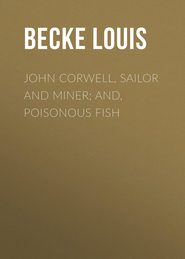По всем вопросам обращайтесь на: info@litportal.ru
(©) 2003-2024.
✖
Rodman The Boatsteerer And Other Stories
Настройки чтения
Размер шрифта
Высота строк
Поля
“That’s all right, Mr. Blackett,” said Hutton, with a hideous grin distorting his monkeyish visage; “I’m only a-tellin’ you of these here things for your own good,… an’ I ain’t afeered of no man-o’-war a-collarin’ me. This here island is a place where you’ve got to sleep with one eye open, an’ the moment you sees a nigger lookin’ crooked at you put a lead pill in him—that is, if he’s a stranger from somewheres. An’ the more you shoots the better you’ll get on with your own nigs; they likes you more and treats you better.”
With a weary gesture, Blackett rose from his seat. “Thank you, Hutton, for your advice. If I thought a nigger meant to send an arrow or a spear through me I’d try to get the drop on him first. But I couldn’t kill any one in cold blood on mere suspicion. I could no more do that than—than you could kill that Aoba wife of yours over there.”
Old Hutton rose, too, and put a detaining hand on Blackett. “Look here, now, an’ I suppose you think I’m lyin’. If I thought that that there Aoba wench was foolin’ me in any way—sech as givin’ away my tobacco to a nigger buck, I’d have to wentilate her yaller hide or get laid out myself.”
Blackett shuddered. “I’m going to turn in. Let us have another drink, Hutton. If the Dutch firm’s schooner shows up this month I’ll clear out of this accursed hole. I hate the place, and so does my woman.” He used the term “woman” instead of wife purely out of deference to Island custom; but Hutton noticed it.
“Ain’t she really your wife?” he asked inquisitively.
“No—yes—what the devil does it matter to you?” And Blackett, whose patience had quite worn out, filled the glasses, and passed one to his visitor, who uncouthly apologised. Then the two shook hands and laughed.
The night was close and sultry, and Cerita was lying on the cane-framed bed, fanning herself languidly. The man was leaning, with his face turned from her, against the open window, and looking out into the jungle blackness that encompassed the house. He was thinking of Hutton’s query, “Ain’t she really your wife?” His wife! No; but she would be yet. He would leave this infernal island, where one never knew when he might get a poisoned arrow or spear into him. He was making money here, yes; but money wasn’t worth dying for. And ‘Rita was more than money to him. She had been the best little woman in the world to him—for all her furious temper.
“Yes, he would leave these blackguardly Solomons, with their hordes of savage cannibals,… and go back to the eastward again,… and Sydney, too. He could easily stow her away in some quiet house while he went and saw his people.” And so Blackett thought and smoked away till ‘Rita’s voice startled him.
“Give me a match, Harry: I want to smoke. I can’t sleep, it’s so hot, and my arm is tired fanning, and the screen is full of mosquitoes. That devil of a girl—where is she?”
“There!” said Blackett, pointing to beneath the bed, where Europuai, his wife’s attendant, lay rolled up in a mat.
“The black beast!”—and the half-blood rose from the bed, throwing the mosquito-net angrily aside—“and I thought she was sleeping near the Aoba woman, the wife of that drunken old Hutton,” and, stooping down so that her black hair fell like a mantle over her bare shoulders, she seized the short, woolly head of the sleeper and dragged her out.
Blackett laughed. “Easy, ‘Rita, easy! You’ll frighten her so that she’ll clear out from us. Let her take her mat over there in the corner. Give the poor devil a chance. She’s terrified of old Hutton, so sneaked in here to hide. She’s only a wild bushy”—and he looked compassionately at the almost nude figure of the girl that his wife had bought from a bush town for a musket—because she wanted “something to worry,” he used jokingly to say.
The savage creature took the mat sullenly, went to the far end of the room, and covered herself up again.
“You’re too soft with women,” said Rita, scornfully.
“I know I am—with you,” he answered, good-naturedly. And then the angry gleam in the black eyes died away, and she laughed merrily.
Two days had passed. Old Hutton had returned to his station, and Blackett was returning with a boatload of copra from a village across the bay. Heavy rain-squalls tore down upon the boat at short intervals, and Blackett, drenched to the skin, began to feel the first deadly chills and pains of an attack of island fever. Usually light-hearted, he now felt angry, and savagely cursed at his crew when the heavily-laden boat touched and ground against the coral knobs that lay scattered about her course. It was long past midnight when he reached his station, and, stepping wearily out of the boat, dragged his aching limbs along the beach. ‘Rita had heard the boat, and Blackett could see that a bright fire was burning in the thatched, open-sided cook-house, and that ‘Rita herself was there, with a number of native children making coffee.
The quickening agonies of fever were fast seizing him, and, entering the house and throwing himself on a seat, he felt his brain whirling, and scarcely noticed that Tubariga, the local chief, was bending over him anxiously. Then ‘Rita came with the steaming coffee, and one quick glance at Blackett’s crouched-up figure told her that the dreaded fever had seized him at last.
‘Rita proved herself what Blackett always called her, “one of the smartest little women going.” With Tubariga’s help, she carried him to the bed, and sent out for some women to come and rub and thump his aching joints while she dosed him with hot rum and coffee. And then Blackett asked her what she was doing out in the cook-house. Hadn’t she a cook? Then the suppressed rage of the hot-blooded girl broke out in a flood of tears. Europuai, the wild bush-girl, had been sulky all the time he was away, and she had given her a little beating with a bamboo. And then the black devil had run away, and—here the angry beauty wept again—she (‘Rita) had to go out into a filthy cook-shed to boil water before a lot of man-eating savages! No one would help her, because they were all such fools that she always lost her temper with them.
Blackett—under the combined influences of rum, strong coffee, fever, and woman’s tears—went into a rage, and glared angrily at the chief, Tubariga.
“You’re a d–d nice fellow,” he said in English; “you get my wife to pay a good musket for a girl, and then as soon as I am away you let that girl run back into the bush. You’re a bad friend.”
Tubariga felt hurt. He prided himself on two things—his knowledge of English and his friendship for white men. He rose to his feet, grasped his rifle, and made for the door.
“Here, come back, Tubariga. Perhaps it isn’t your fault. Let her stay away. She’s no good, anyway.”
Tubariga came back. “Tell me, white man, do you want your servant to come back?”
“Yes, d– you!” answered Blackett, who now again was seized with that hideous brain-whirl that in fever is simple delirium, “bring her back, alive or dead.”
The chief nodded and went out.
Next morning the first fierce violence of the fever had temporarily left him, and Blackett was lying covered up with rugs, when the grim figure of Tubariga entered noiselessly, and stole to his side. Motioning the trader’s wife away, Tubariga’s savage features relaxed with a pleased smile.
“Well, Tubariga, how are you?” said Blackett. “‘Rita tell me I damn you too much last night, eh? Never mind, old chap, I was mad about that girl running away. You can tell her people to keep her—and the musket too. Rita don’t want her any more. Ship come soon, then we go away.’”
Again the pleased smile spread over the chiefs face. Bending over Blackett he placed his hideous lips, blood-red with the stains of betel-juice, close to his face, and said with the simple pride of a child, “Me pinish him.”
“What?” said Blackett, with a strange feeling at his heart—“What did you do to that girl, Tubariga?”
Sitting down with his rifle across his knees, the chief told the conscience-stricken trader that he had followed the girl to a bush village, where he, Tubariga, as their chief, had demanded her from her parents. They insisted on her going back, but she whimpered and said that the white man’s wife would beat her. She sprang for the jungle, and, ere she reached it, a bullet from the chiefs rifle struck her in the side. And then, with a feeling of horror, Blackett listened to the rest of the tale—the poor wretch, with her life-blood ebbing fast, was followed up and a spear thrust through her heart.
He was sitting at the table with his face clasped in his hands when ‘Rita came in. She was smoking her inevitable cigarette, and the thin wreaths of blue smoke curled upwards from her lips as she leant one arm on the table and caressed Blackett’s ice-cold forehead with her shapely hand. Suddenly she stooped and sought gently to remove his hands from his face.
“Harry, are you very ill, old fellow? What can I do for you?”
“Do for me?” and the sudden misery that had smitten his heart looked out from his pallid face,… “give me back the peace of mind that was mine ten minutes ago. Leave me to die here of fever—for you I have become a murderer—a man no better than Hutton. The blood of that poor girl will for ever be between us.” And then she saw that tears were falling through his trembling fingers.
“Harry,” she said, “I thought you were more of a man”—and here her voice softened—“don’t grieve over it. It wasn’t your fault,… and I have been a good little girl to you. Don’t be miserable because of such a little thing as that. If Tubariga hadn’t killed her, I daresay I should have done so myself. She was a sulky little wretch.”
I know Blackett well. The horror of that day has never entirely left him. But for that one dark memory he would have married ‘Rita—who would have most probably run a knife into his ribs later on, when the influence of her beauty had somewhat waned and he began to look at other women. The fateful impulse of that moment when he told the chief to bring back the girl dead or alive wrecked and tortured his mind beyond description. And he can never forget.
His ‘Rita and he left the island soon afterwards to wander away back to Eastern Polynesia, but his continued fits of melancholy annoyed the girl so much that she one day quarrelled with and left him, and made a fresh matrimonial engagement with a man less given to mawkish sentiment.
THE TRADER
I
The evening fires were lighting up the darkness of the coming night, when Prout, the only white man on the island, left his house on the edge of the lagoon, and, with his little daughter running by his side, walked slowly through the village.
As they passed through the now deserted pathways that intersected the straggling collection of grey, thatched-roofed houses, and Prout’s heavy step crunched into the broken coral, the natives, gathered together for their evening meal, looked forth, and the brown women called out a word or two of greeting to the child, and smiled and beckoned her to leave her father for an instant and take the fruit or piece of cooked breadfruit that they held out to her with their brown hands. But only a solemn shake of the little head, and then she and the taciturn, bronzed-faced man went by, the child’s tiny fingers grasping his tanned and roughened hand as they walked across the narrow island towards the sound of the muffled thunder of the surf on the outer ocean beach.
Here, with the little one perched beside him and looking wonderingly into his grave, impassive face, the white man would sit for long hours staring moodily out upon the tumbling breakers as they reared and fell upon the black, grim shelves of the reef.
Sometimes, as he sat with his chin resting on his hand, and the red glow of his pipe sending now and again a fitful gleam of light across the rugged lines of his face, the girl would get quietly down from the moss-grown coral boulder on which she rested by his side, and stepping down to the short, steep beach, play with childish solemnity with such pebbles and light shells as lay within the reach of her little hands. Perhaps, if the tide was heavy and at its flood, and a breaker heavier than the rest breached shorewards in a white wall of seething foam, and crashed and rattled together the loose coral slabs that marked the line of high-water mark, the silent, dreaming man would spring to his feet with a loud warning call. And the little one, answering his deep tones with her soft, sweet treble, would spring back to her father’s side, and nestling her tender form against his gaunt frame, lay her cheek against his, and say, in the soft Tokelau tongue, “‘Twas a great wave, my father!”
“Aye,” he would answer, as he placed an arm round the child and gazed at her for a moment, “‘twas a great wave truly, taka taina,[1 - “Little one of my heart.”] and thou art so small, that if it but touched thy feet thou wouldst be swept away like as a leaf in a strong wind. So stay thee here beside me, sweet one,” and again his face would turn seaward, and the silence of the night, save for the soughing of the wind and the cry of the surf, fall upon them again.
Thus the first hours of the island night would pass, till a glare of light flashed upon the blackness of the sea beyond the snow-line of surf, as the canoes from Matakatea would round the point, each one with a flaming torch of dried palm-leaves held high by a brown, tattooed hand, to dazzle the flying fish that, with wings outspread, floated motionless upon the surface of the water.
Then, because the child had no playmates, and her little life was almost as joyless and as solitary as his own, he would wait with her till the long line of canoes passed by, so that she could see the bronzed, half-naked figures of the paddlers, and the bright gleam and shimmer of the fish as they were swept up by the deadly net, and hear the warning cry from the torch-bearers, as in the depths beneath they saw the black shadow of a prowling shark rushing to seize the net, or perchance the outrigger of the canoe, in his cruel, murderous jaws.
Slowly the canoes paddled by, and as they passed, the hum of voices and laughter and the cheery lilt of island melody died away, and the paddlers looked shoreward to the motionless figure of Prout, who, with the child by his side, seemed to heed naught but the wide sweep of ocean that lay before him.
But though the voices and laughter and snatches of song ceased, many of the kindly-hearted people would, ere they passed, call out a word or two of greeting to the white man and his child, and the latter would wave her hand and smile back, while her father, as if awakened from a dream, called out, in the island tongue, the customary “May your fishing to-night be lucky.” And then, as the last canoe vanished, and the glare and the smoke of the torches with it, he, with the little Mercedes by his side, walked back to his house on the lagoon.
And so, night after night, save in the stormy season of the year, when the white rain-squalls gathered together on the windward sea-line, and swept quickly down upon the island and drenched the loose, sandy soil with pouring showers, the white man had sat with his face turned seaward to the cloudless horizon of the starlit ocean and his mind dwelling upon the ever-present memories of the past.
Such, for three years past, ever since he had first landed among the people of Nukutavau, had been the existence of Prout, the silent, solitary trader.
II











